Yes, let’s!
I’m probably not going to post about every video I do for this…I just wanted to let you guys know I’m doing it. I love Starflight, despite its flaws, and I want more people to learn about this groundbreaking game.
Yes, let’s!
I’m probably not going to post about every video I do for this…I just wanted to let you guys know I’m doing it. I love Starflight, despite its flaws, and I want more people to learn about this groundbreaking game.
We’re wasting away again in RPG-a-ville.
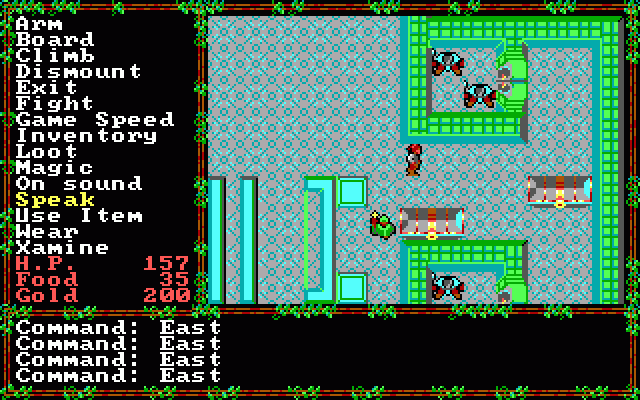
This game has an interesting history…which I can’t talk about until someone guesses it. So, name and developer, please! If you win, I’ll let you try out my new machine that digitizes people and puts them inside the computer! You’ll be able to play the games as if you’re actually there! Don’t worry, the theory is perfectly sound…what could go wrong?
So two froody dudes, Dan “Gibbage” Marshall and Ben Ward, decide to stop piddling about with their own pathetic projects and team up, creating Size Five Games (previously Zombie Cow Studios) in the process.
And to celebrate, they decided to give away a game for free – an adventure game called Ben There, Dan That!, which stars…um, them. That’s right, you control Ben and Dan as they bumble through a loving homage to the classic Lucasarts Adventure games, doing things like smacking priests with bibles, visiting alternate dimensions, and…um…climbing out of a cow’s rear end. Hey, they’re British.
Now, even given the fact that they used Adventure Game Studio to create the game, that’s a heck of a lot of work to just give away. But I heartily, heartily approve of the process, and not just because I’m cheap. I think it’s the right thing to do because it helps them grow their community, and I believe that community is the solution to all of gaming’s problems.
Does your game stink? Get people interested in the potential your game might have and they can help you fix it. And you don’t have to do it all before you ship. Feedback after you ship is just as vital – but those lines of communication must be open.
Are you having trouble marketing your game? Again, community can help. Bungie‘s testers sang the praises of Myth: The Fallen Lords to all their friends once their NDAs were lifted, which helped Bungie as they took their first steps into the PC market.
Are you having trouble keeping people interested in your game? Once again, community to the rescue. The most popular online first-person shooter in the world is still Counter-Strike, which kept copies of the original Half-Life on store shelves for years. The incredible response of the Korean community means that you can still walk into a Wal-Mart and buy a copy of StarCraft – a game that was released in 1998! Caravel Games goes even farther with their Deadly Rooms of Death series. The DRoD games consist of a layout of rooms, each containing a puzzle. The DRoD website gives you an overall map of the game – and clicking any room on the map takes you to a forum thread discussing that room. It’s an excellent way to provide player-based support, in addition to player-created content.
Are you having trouble funding your game? Yes, this is the iffiest one, but it’s been done. Lots of people have started by creating a small, well-supported game and then rolling the profits from that into something much larger. I think my favorite story of this nature is that of Jeff Minter, who was saved from having to get a real job by the incredible response to Llamatron, which Minter released for free along with a README.TXT file that included this paragraph:
Here’s the deal. You play Llamatron and check out the hook. If it gets you (and I reckon it will if you like mayhem), then send us a fiver and, as a reward for being so honest, we will send you an ace poster of our gun-toting llama, a newsletter, and a complete copy of Andes Attack, originally released in 1988 to considerable critical acclaim. Two games for a fiver – can’t be bad. And if the response is good, there will be more Shareware. And better.
This is the kind of thing Jeff Vogel is talking about when he says, “Shareware is a force for good.”
And finally, the big one.
Are you having trouble with people pirating your game?
Well, of course you are. People pirate stuff. They’re going to do it. You can’t do much about it.
If you want to come to terms with piracy, you need to come to understand that you’re not trying to eliminate it. You’re trying to reduce its impact to the point where you can still make the money you need to make on your game to stay in business. I wish I could tell you to just ignore piracy but I can’t – you should be going onto those download sites and demanding that they remove your game, because you do want pirating your game to be more complicated than just doing a Google search.
How can community help here?
Well, it’s harder to steal from somebody when you feel like you know them personally. It’s also harder to steal from somebody when they are trying to be the good guys.
The seminal example of using community to beat piracy is Stardock’s Galactic Civilizations 2. Absolutely no anti-piracy stuff on the disc. No CD key. No CD check. No phoning home. No refusing to run if there’s a compiler on the same system. No installing low-level drivers that monitor all data traffic without the user’s knowledge. Nothing. The only thing it uses is a unique account key that allows you to create a support account on Stardock’s digital distribution network, so that you can redownload the game if you lose your discs.
And yet it sold a bazillion copies and was a huge moneymaker for Stardock. And as I’ve mentioned before, one of those copies was sold to me. Even though I’ll never have time to play such an involved game. Why did I buy it? Because they were doing it right.
I have said that game design is a conversation between the developer and the player. But now I’ve come to realize that the metagame of game development is the same thing.
If you want to succeed in game development, don’t just make games. Help people have fun. And that means getting personally involved, with all the risks that carries.
I told you it was going to be a bit more involved. These games are all quite recent (released within the last three to five years) and are all PC games. So, to make things harder, I’ve given you a whole bunch of games to identify and have shrunk the screenshots down to 400×300. On the other hand, I’ve grouped the nine games into three logical groups so in the end it shouldn’t be too hard to figure them out.
Enjoy! If you are the first person to name all nine games and their developers, I will name a kitten after you.
RTS Games:
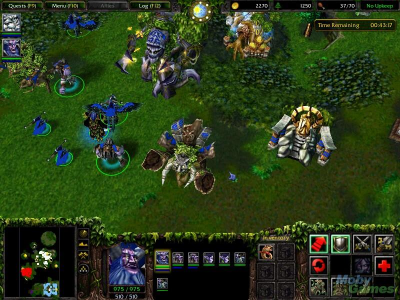
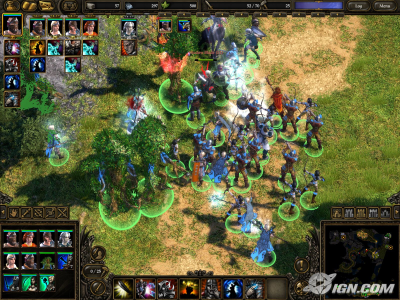
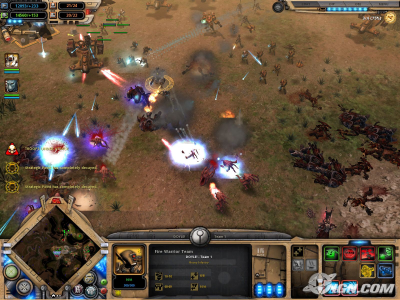
FPS Games:
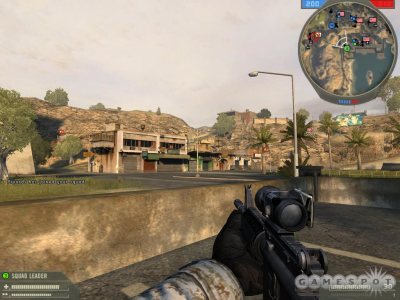
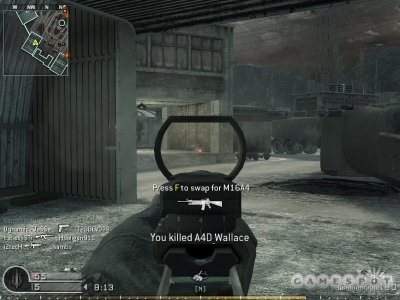
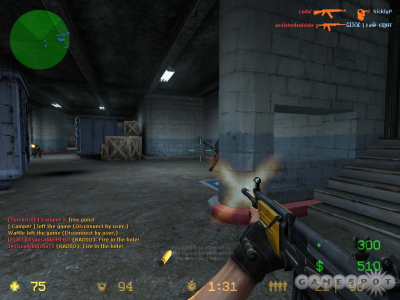
Strategy Games:
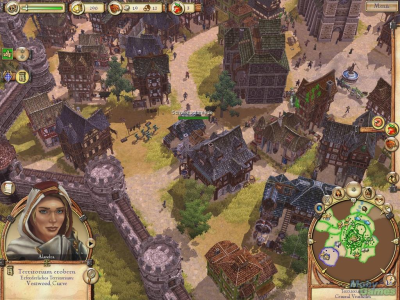
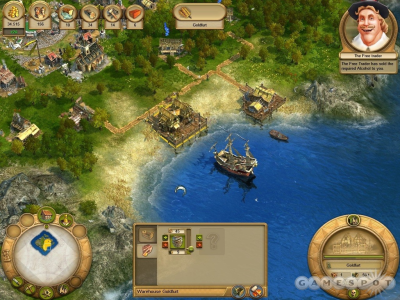
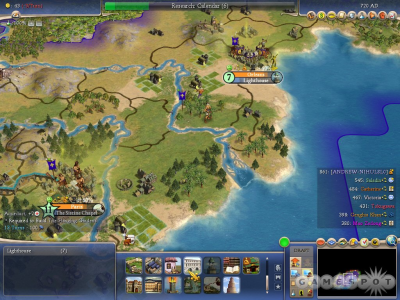
Point? No, I wasn’t really trying to make a point. Why do you ask?
Here’s the first bit of an email I got today:
Hello Anthony,
I hope this email finds you healthy and well *smile*. My name is Elizabeth and I am a Senior Talent Scout at [company name redacted] and I SO need your assistance.
Chuck, I need Senior SW Engineers with Casino Games experience like yesterday!!! This is for a fun, dynamic team in Austin, Texas responsible for the development and documentation of casino game software.”
Yeah, uh, you missed a search-and-replace at the beginning of that second paragraph, Elizabeth. It kind of spoils your attempt to suggest that this is a personal email directed solely at me.
Tim Schafer cannot catch a break in this goddamn industry.
Move on, Tim. Go work for Pixar. Write an animated movie for them and make a hojillion dollars. I know you loving Gaming, but Gaming is currently controlled by her chain-smoking crack-addicted abusive alcoholic mother Corporate Game Development and until Gaming finds the courage to sneak out of her mother’s house and jump into your convertible so you can spirit her away, you two are obviously never going to be together.
Edit: I jumped the gun just a bit on this (though reading that headline, can you blame me?) I had actually gone to the Double Fine Action News Site to find out if Brutal Legend was going to be okay. I did not think to mouseover the picture of the weevil, but that’s Schafer for you.
Edit 2: Turns out that Activision did drop Brutal Legend – fortunately, Double Fine owns the IP. So things aren’t quite as rosy as Tim made them out to be. Yes, in theory, with Guitar Hero and Rock Band making squillions of dollars finding a new publisher for Brutal Legend should be a no-brainer, but please see the “chain-smoking crack-addicted abusive alcoholic mother” comment I made above.
I am inclined to agree. Pulled down the demo over Xbox Live and I am very impressed with it. Lego Star Wars was much more combat-oriented, with the gameplay basically consisting of you entering an arena, shooting or eviscerating anything that moved, and then figuring out how to move on to the next arena. David actually had trouble with this because most of the puzzles weren’t explicated very well. Most of them required you to use a Jedi power to open a path for another character, who could then open the door. While David did figure it all out eventually, I had to help him a fair bit and there was some frustration.
Lego Indiana Jones is much closer to a traditional platformer with lots and lots of well-constructed puzzles to solve as well as some combat. And excellent cutscenes – when Lego Indy escapes the first temple after being chased by the ball he is confronted by Lego Belloc, who demands the golden idol. Lego Indy tries to give him Lego C-3PO’s head instead. I don’t care who you are, that’s funny right there.
One of my design philosophies is “Let players be clever, and reward them when they are” and Lego Indiana Jones follows that philosophy well. And frankly I was amazed at how quickly David – without any direction from me – figured everything out. He had no trouble with the puzzles where you had to do something with one character then switch to another because the game made it much more clear what you were supposed to do. After seeing the demo I will definitely be picking it up.
Yes, it’s another “while you are waiting” post. Deal.
I’ve got a couple friends here at work whose websites are definitely worth checking out.
First, Patrick Rogers. He’s an avid Go player who recently hit traffic gold on his site by being the first person to post the complete lyrics to all three episodes of Dr. Horrible.
Second, Brandon “Rusty” Parks. Rusty’s a real character, as you’ll be able to tell when he starts talking about how the universe has a discrete pixel size and a discrete frame rate.
Third, Bobby Thurman…who I actually don’t work with any more and probably should keep in better contact with.
And finally, you know those people who keep coming into game development forums or IRC channels and ask how to program an MMORPG? Yeah, laugh at them. Go ahead. Because everybody knows that nobody can possibly write an indie MMORPG. And oddly enough, it’s being worked on by all three of the gentlemen I detailed above! What are the odds?!
…no, don’t fill out your registration card and send it in. Brush up on your gaming history instead!
Read about the rise and fall of Mucky Foot, successors to Bullfrog and creators of Urban Chaos and StarTopia.
You may have heard about Ion Storm‘s spectacular flameout, but if you’ve never read the original Dallas Observer article on it, you should!
And you should also read Allen Varney’s excellent (if somewhat biased) article on how EA bought and then destroyed Origin Systems.
Enjoy!
Yeah, that crunching sound? It denotes crunching.
Which is why I haven’t been posting, why I haven’t been able to do anything with Planitia this week and why Name That Game 50! isn’t done (it’s not going to be a contest, but it is going to be a bit involved).
My apologies. Hopefully things will loosen up within a week or two.
| S | M | T | W | T | F | S |
|---|---|---|---|---|---|---|
| 1 | 2 | 3 | ||||
| 4 | 5 | 6 | 7 | 8 | 9 | 10 |
| 11 | 12 | 13 | 14 | 15 | 16 | 17 |
| 18 | 19 | 20 | 21 | 22 | 23 | 24 |
| 25 | 26 | 27 | 28 | 29 | 30 | 31 |
Copyright © 2025, Viridian Games. Proudly powered by WordPress. Blackoot design by Iceable Themes.
